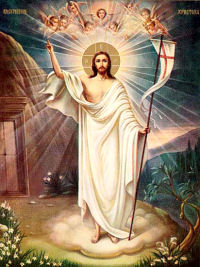Thursday, April 5, 2012
EASTER
According to Christians around the world, Easter is a day set aside to commemorate Jesus' resurrection from the dead. But the history of Easter is more complicated than that. The name of the holiday is derived from the name of an ancient, pagan goddess, Eastre, sometimes spelled Eostre. Eastre was the goddess of spring and worshipped by the Teutonic tribes that the early Christians ministered to.
At this point, the history of Easter becomes a little complicated. The early missionaries, seeking to convert the people of the Teutonic tribes, adopted the celebration of Eastre's festival as their own. Since the festival fell around the same time as the Christian's memorial of Jesus' resurrection, the missionaries simply substituted one holiday for another. This allowed the new converts to continue their tradition, but its meaning and purpose had changed.
The history of Easter continued to be complex as the actual date of the celebration was never fully established. Some linked the memorial to the ancient Hebrew calendar's celebration of Passover. Others linked the date to the spring equinox. Finally, in 325 A.D. Emperor Constantine met with other church leaders and together they decreed that Easter would fall on the first Sunday after the first full moon after the spring equinox. However, the controversy over the holiday's date continues with some the Eastern Orthodox Churches still celebrating it at the end of Passover week.
The history of Easter wouldn't be complete without mention of the Easter Bunny and Easter Eggs. Both of these common symbols of Easter are derived from ancient, pagan traditions. Eastre's pagan symbol was the rabbit or hare. The giving and receiving of eggs was also a common tradition in the Teutonic tribes, eggs symbolizing rebirth and renewal.
With or without the Easter Bunny, Easter today, means victory over death for millions of Christians around the world. For it was on this day in the history of Easter, that Jesus conquered death and rose again, bringing light, love, and life to the world forever.
According to Christians around the world, Easter is a day set aside to commemorate Jesus' resurrection from the dead. But the history of Easter is more complicated than that. The name of the holiday is derived from the name of an ancient, pagan goddess, Eastre, sometimes spelled Eostre. Eastre was the goddess of spring and worshipped by the Teutonic tribes that the early Christians ministered to.
At this point, the history of Easter becomes a little complicated. The early missionaries, seeking to convert the people of the Teutonic tribes, adopted the celebration of Eastre's festival as their own. Since the festival fell around the same time as the Christian's memorial of Jesus' resurrection, the missionaries simply substituted one holiday for another. This allowed the new converts to continue their tradition, but its meaning and purpose had changed.
The history of Easter continued to be complex as the actual date of the celebration was never fully established. Some linked the memorial to the ancient Hebrew calendar's celebration of Passover. Others linked the date to the spring equinox. Finally, in 325 A.D. Emperor Constantine met with other church leaders and together they decreed that Easter would fall on the first Sunday after the first full moon after the spring equinox. However, the controversy over the holiday's date continues with some the Eastern Orthodox Churches still celebrating it at the end of Passover week.
The history of Easter wouldn't be complete without mention of the Easter Bunny and Easter Eggs. Both of these common symbols of Easter are derived from ancient, pagan traditions. Eastre's pagan symbol was the rabbit or hare. The giving and receiving of eggs was also a common tradition in the Teutonic tribes, eggs symbolizing rebirth and renewal.
With or without the Easter Bunny, Easter today, means victory over death for millions of Christians around the world. For it was on this day in the history of Easter, that Jesus conquered death and rose again, bringing light, love, and life to the world forever.





